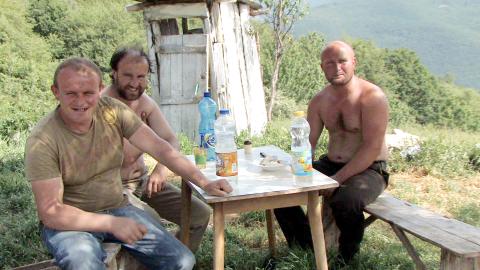Do you know the connection between your mobile phone and the ongoing civil war in Congo? Or are you aware that half of the food produced worldwide ends up in garbage bins?
If not, then the Best of INPUT 2011, which is hosted by the Public Television Service (公共電視台, PTS), will be an enlightening experience as this year’s edition of the annual showcase features 10 public television programs selected for their challenging viewpoints and daring explorations from eight countries,.
The Best of INPUT event is part of the activities organized by the International Public Television (INPUT) organization, which PTS is partnered with. Initiated in 1977 by a group of program-makers in Europe as an international voluntary body that supports television as a public service, INPUT organizes many activities throughout the year, the most important of which is an influential screening conference that aims to encourage new and courageous television program-making. Some 80 works selected from about 300 entries are screened at the conference each year, and are also made available to INPUT partners who want to hold Mini INPUT or Best of INPUT events in their own countries.

Photo courtesy of PTS
“Being the only one of its kind, INPUT does not select the best productions. We want to show works worth debating and discussing in terms of innovation, the issues presented and television program-making methods and techniques,” said director of PTS’ international department Lin Le-chun (林樂群), who served on INPUT’s selection committee from 2004 to 2006.
A good example of innovative broadcasting is veteran Polish director Andrzej Fidyk’s Yodok Stories, a revealing documentary about life in Yodok, one of the biggest concentration camps in North Korea. Since no camera crew has ever been allowed to film in Yodok, where people are routinely subjected to torture, rape and starvation, Fidyk tracks down the very few North Korean defectors who have escaped from the camp and inspires them to create a Broadway-style musical that tells their stories.
Another authoritarian regime is unmasked and examined in Love, Hate and Propaganda. Produced by Jim Williamson from the Canadian Broadcasting Corporation, the documentary reveals how Adolf Hitler and his regime successfully mobilized the German population for war through propaganda, including the Nazi-controlled press, which portrayed the invasion of Poland as a defensive war, and through films such as The Eternal Jew (1940), which viciously derides Jews as vermin.

Photo courtesy of PTS
For his investigative documentary work Blood in the Mobile, Frank Piasecki Poulsen of Denmark embarks on a life-threatening journey to Congo, where he witnesses the brutal working conditions in the country’s largest tin mine, which is controlled by various armed groups. Working for next to nothing, children are seen toiling in mine tunnels digging out the minerals that end up in cellphones that are sold around the world.
In Fresh From the Trash, German director Valentin Thurn travels through Western Europe and the US to show us why bananas grown in Cameroon are transported thousands of kilometers to Paris and thrown away before they reach supermarket shelves, and how the merchants’ strict rules regarding the size, shape and even color of vegetables lead to the waste of massive amounts of food.
As a self-reflexive experiment, The Game of Death by Thomas Bornot from France sets out to explore television as an authoritative figure in today’s world by re-enacting the 1960s Milgram experiment in the form of a reality game show.

Photo courtesy of PTS
Meanwhile, humanity is quietly meditated on in the slow-paced, beautifully crafted Village Without Women, by Srdjan Sarenac. With nine years of filmmaking experience in Bosnia, Serbia and Croatia under his belt, Sarenac follows three Serbian bachelor brothers living in the village of Zabrdje, which is devoid of females. The oldest brother decides to find a bride in Albania, despite the fact that the three brothers once fought against the country.
The Best of INPUT 2011 is being held in Kaohsiung this weekend and will move to Taipei in two weeks. Directors Sarenac and Thurn will attend question-and-answer sessions after screenings in Kaohsiung, while filmmakers Bornot and Williamson will discuss their works with audiences in Taipei.
Admission to the event is free. Tickets are handed out 30 minutes before each screening. For more information, visit the event’s bilingual Web site at 2011bestinput.pts.org.tw.

Photo courtesy of PTS

Photo courtesy of PTS

June 9 to June 15 A photo of two men riding trendy high-wheel Penny-Farthing bicycles past a Qing Dynasty gate aptly captures the essence of Taipei in 1897 — a newly colonized city on the cusp of great change. The Japanese began making significant modifications to the cityscape in 1899, tearing down Qing-era structures, widening boulevards and installing Western-style infrastructure and buildings. The photographer, Minosuke Imamura, only spent a year in Taiwan as a cartographer for the governor-general’s office, but he left behind a treasure trove of 130 images showing life at the onset of Japanese rule, spanning July 1897 to

One of the most important gripes that Taiwanese have about the Democratic Progressive Party (DPP) is that it has failed to deliver concretely on higher wages, housing prices and other bread-and-butter issues. The parallel complaint is that the DPP cares only about glamor issues, such as removing markers of Chinese Nationalist Party (KMT) colonialism by renaming them, or what the KMT codes as “de-Sinification.” Once again, as a critical election looms, the DPP is presenting evidence for that charge. The KMT was quick to jump on the recent proposal of the Ministry of the Interior (MOI) to rename roads that symbolize

On the evening of June 1, Control Yuan Secretary-General Lee Chun-yi (李俊俋) apologized and resigned in disgrace. His crime was instructing his driver to use a Control Yuan vehicle to transport his dog to a pet grooming salon. The Control Yuan is the government branch that investigates, audits and impeaches government officials for, among other things, misuse of government funds, so his misuse of a government vehicle was highly inappropriate. If this story were told to anyone living in the golden era of swaggering gangsters, flashy nouveau riche businessmen, and corrupt “black gold” politics of the 1980s and 1990s, they would have laughed.

In an interview posted online by United Daily News (UDN) on May 26, current Chinese Nationalist Party (KMT) Chairman Eric Chu (朱立倫) was asked about Taichung Mayor Lu Shiow-yen (盧秀燕) replacing him as party chair. Though not yet officially running, by the customs of Taiwan politics, Lu has been signalling she is both running for party chair and to be the party’s 2028 presidential candidate. She told an international media outlet that she was considering a run. She also gave a speech in Keelung on national priorities and foreign affairs. For details, see the May 23 edition of this column,